How the Insiders See Outside Events Shaping the Race for Governor
Steve Grossman has run the best campaign so far—but the race for governor will be shaped by forces largely beyond any candidate’s control.
That’s the view from more than 90 plugged-in political observers from across the state in my latest Insiders Poll of the 2014 Massachusetts elections.
This month, I asked them to predict the effect that several developments will have on the gubernatorial race, on a scale from zero (no effect) to 10 (huge impact). They rated casino issues highest, with an average of 5.0; they see the least impact from the lack of a People’s Pledge among the Democratic candidates, with an average response of 3.3.
They had a lot to say in their comments about those effects, showing a wide range of analysis and interpretation. As you’ll see below, they often disagreed on who would be most helped or hurt by each issue.
I also asked the insiders which one candidate they thought had run the best campaign so far. Grossman was the clear top choice, followed by Martha Coakley—although many of the comments indicated that none of the candidates has been all that impressive.
Here is a more detailed look at the responses. A partial list of the responding insiders is at the bottom of this post.
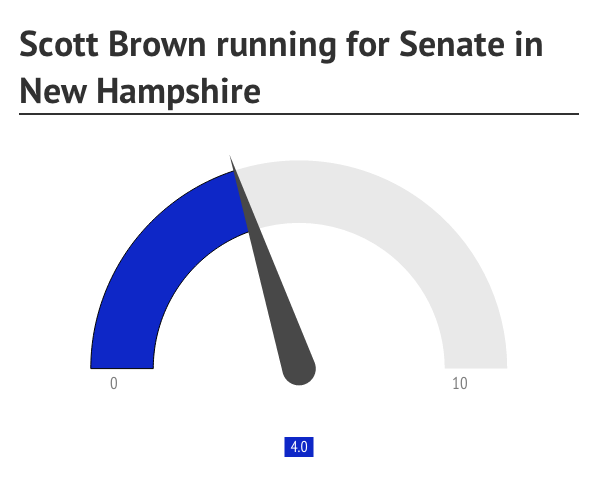
All charts created with infogr.am
Most of the insiders think that Scott Brown’s high-profile challenge to Democrat Jeanne Shaheen will hurt Republican Charlie Baker, to the benefit of the eventual Democratic nominee. Many expect Brown to siphon money, volunteers, and media attention from Baker; others say that the ad wars in the New Hampshire Senate race—which will undoubtedly run on Boston TV and radio stations—will reinforce Bay State dislike of the national Republican brand.
Some, however, disagree. Brown’s popularity and image as a moderate, they argue, will work well alongside Baker’s attempt to sell himself as a likable New England-style Republican.
Few doubt that the Brown-Shaheen battle will add heavily to the sheer volume of political advertising bombarding Massachusetts residents as 2014 heats up—prompting more of them to tune it all out, and making it harder for anyone to cut through the clutter. In theory, that should help frontrunners—like Coakley —while hurting those trying to play catch-up.
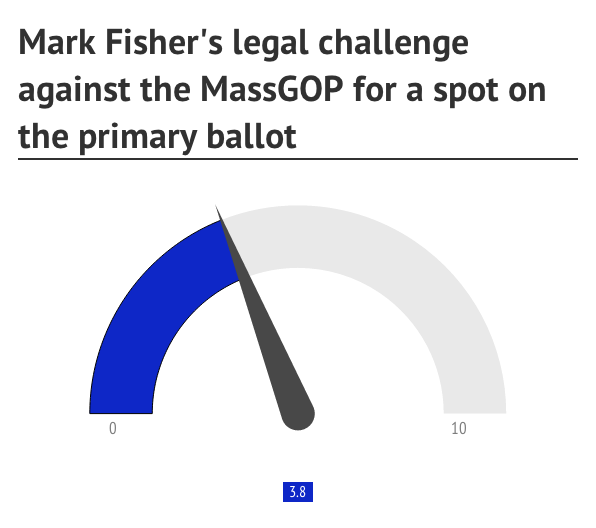
It’s probably safe to say that, three months ago, few expected Mark Fisher to be any more of a factor than Jack E. Robinson was, when he took 10 percent against Scott Brown in the special election US Senate primary in late 2009. That was before the state Republican Party denied Fisher a spot on the ballot in a controversial state convention vote count. Fisher has sued the party, and after a public airing of accusations and counter-accusations, the party has agreed to place Fisher on the primary ballot (pending approval by the Secretary of State).
Few insiders think this will have a huge effect on the race, but they no longer view it as a Robinson-esque non-factor. The vast majority say that the debacle hurts Baker, by making him look weak and ineffective at handling a relatively minor irritant like Fisher.
Quite a few add that the resulting internal Republican party conflict will create additional problems for Baker. He could have trouble raising money and recruiting volunteers over the summer, now that he has a primary opponent rather than being the official nominee. And it’s possible, some say, that lingering hard feelings could drive some conservatives to vote for an independent candidate in November, or skip the election altogether.
On the other hand, a minority of the insiders argue that Baker will benefit in the long run. They say that a primary campaign against Fisher will reinforce Baker’s image as a moderate, helping him win the crucial swing voters he needs in November.
One caveat: several insiders say that the impact could change significantly if Fisher is granted discovery in the court case in time for party documents to become public before November—and if those documents support Fisher’s contentions that the convention vote was manipulated, and that the party colluded with the Baker campaign.
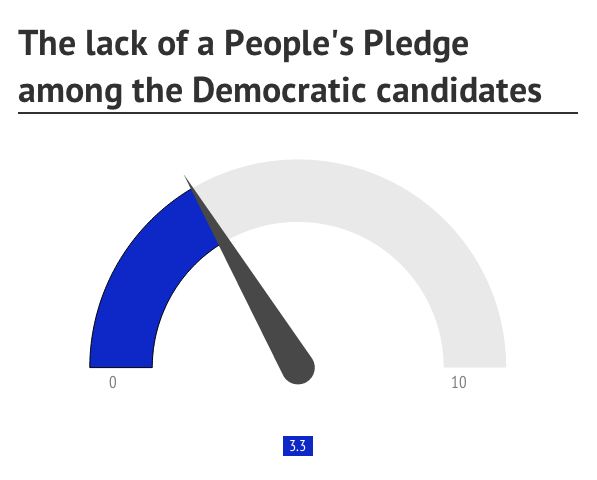 Outside spending has the green light, at least for the moment, thanks to the inability of the Democratic campaigns to agree to a so-called People’s Pledge. Insiders divide this issue into two distinct parts: the maneuvering for the “clean elections candidate” mantle; and the actual advertising that will be unleashed.
Outside spending has the green light, at least for the moment, thanks to the inability of the Democratic campaigns to agree to a so-called People’s Pledge. Insiders divide this issue into two distinct parts: the maneuvering for the “clean elections candidate” mantle; and the actual advertising that will be unleashed.
The widespread feeling is that the first concern, which has recently been the subject of intense bickering among the Democratic candidates, will have little or no effect on the race. These insiders seem to have adopted the view that, regardless of what voters might claim in polls, accepting or denouncing outside spending plays very little role at the voting booth—even for the core progressives currently being wooed by these Democrats.
The outside spending itself, however, could make a difference, they say. The likely beneficiaries, they say, are Coakley and Grossman, who appear to have deep-pocketed allies ready to get involved; underdogs Joe Avellone, Don Berwick, and Juliette Kayyem, who so far don’t seem to have that kind of outside support, figure to be hurt most.
Some insiders also count Baker as a winner here. Those outside groups are likely to run ads during the primary attacking other Democrats in the race, harming the eventual nominee. Plus, having skipped the Pledge in the primary, Democrats will be in no position to criticize Baker for opting out of it in the general election, when he will be counting on outside spending from the Republican Governors Association and others.
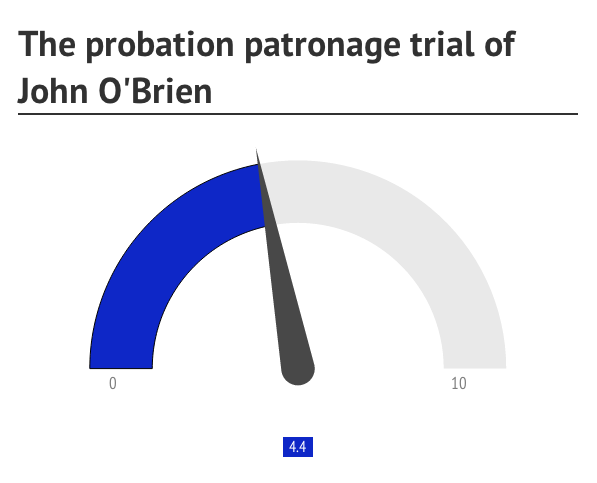 The long-awaited trial of former probation head John O’Brien was just getting underway as the insiders were taking this poll, and some expressed surprise at the relatively low-level coverage and buzz about it. Still, the vast majority believe that it will have at least some harmful effect on the Democrats, helping Baker campaign against business-as-usual on Beacon Hill.
The long-awaited trial of former probation head John O’Brien was just getting underway as the insiders were taking this poll, and some expressed surprise at the relatively low-level coverage and buzz about it. Still, the vast majority believe that it will have at least some harmful effect on the Democrats, helping Baker campaign against business-as-usual on Beacon Hill.
But few expect the fallout to be too substantial, especially in the governor’s race. Coakley, they say, might get hurt more than others, since her name could get bandied around in the proceedings. But Democrats, the insiders say, have more to worry about in state legislature elections.
Of course, things could change depending on what comes out at trial. Several of the insiders expressed special interest in the effect if the government’s list of “unindicted co-conspirators” gets disclosed.
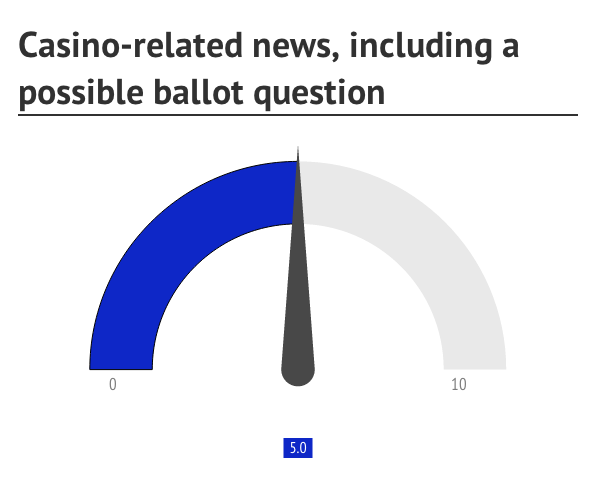 Casinos in the Commonwealth is the political hot potato that refuses to cool down. After all this time, it is still rearing its head—even in a gubernatorial campaign in which, many insiders note, there isn’t really much policy difference among the candidates.
Casinos in the Commonwealth is the political hot potato that refuses to cool down. After all this time, it is still rearing its head—even in a gubernatorial campaign in which, many insiders note, there isn’t really much policy difference among the candidates.
Nevertheless, the insiders see Coakley as the most vulnerable here, as a result of her ruling as Attorney General that the repeal initiative is ineligible for the November ballot. That decision is being challenged in court; casino opponents do not seem mollified by Coakley’s distinction between her policy views and her legal interpretation. Insiders generally indicate that she has not done well parsing her position recently—”tying herself in knots,” one comments.
Berwick is seen as the most likely to benefit from the ongoing controversy, the insiders say, although several add that staking out the anti-casino position didn’t ultimately do much for Boston mayoral candidate Bill Walczak.
In fact, the insiders seem uncertain about how the casino controversy will play out in the campaign for governor, or who it will help or hurt—but they clearly don’t think it’s going to go away quietly.
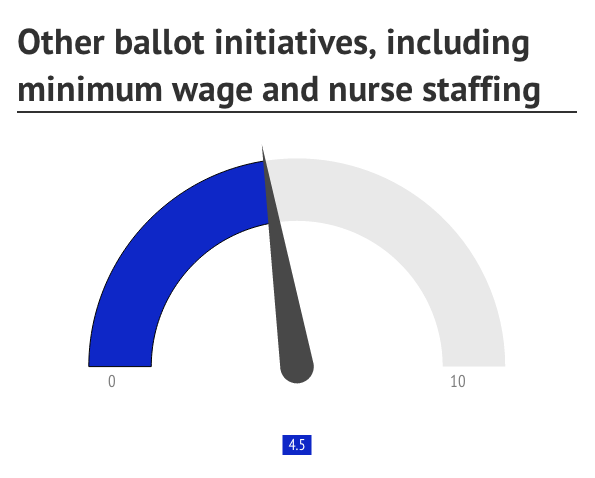
Although they haven’t received the attention of the casino repeal, there are a series of interesting questions heading to the November ballot. That includes the gas tax indexing repeal dear to the state’s conservatives, but also a bunch of initiatives that could mobilize Democrats. In addition to minimum wage and nurse staffing, voters will be asked about sick leave policy, bottle bill expansion, and hospital financial transparency.
That’s why, despite being below the public radar, these initiatives are ranked second only to casinos by the insiders in their impact on the governor’s race.
The insiders see two likely effects, both benefiting the eventual Democratic nominee.
First, the ballot questions could generate voter enthusiasm and turnout among Democratic voters who might otherwise skip the mid-term election. In particular, some insiders say that the Service Employees International Union and others will be organizing hard among black and Hispanic voters on the ballot questions.
Secondly, some insiders think Baker will be put in a difficult position by some of the ballot measures. He has already voiced support, in theory, for increasing the minimum wage. But the nurse staffing and hospital transparency might be tough pills for the former health care executive to swallow. And, Baker might not sound very convincing to people if he is forced to talk much on issues like minimum wage and sick leave, regardless of the position he is officially taking.

One thing emerged clearly from the comments to this question: most insiders are not terribly impressed with any of the campaigns so far.
Nevertheless, more than a third give the nod to Grossman, who they say has doggedly fought for delegates, won endorsements, and staked out policy positions—while demonstrating that he is ready and willing to take the fight to frontrunner Coakley.
Of course, the most important measure of a good campaign lies ultimately in winning over voters, and polls suggest Grossman has made little headway there in nearly a year since declaring his candidacy. Just over a quarter of insiders say Coakley has done the best, with many pointing out that the frontrunner doesn’t seem to have lost any of her lead, either in the primary or general-election polling.
Berwick, who has effectively staked out the true-progressive mantle in the Democratic field, came in third, just ahead of Baker.
Participating Insiders include (affiliations for identification only): John Affuso, Massachusetts Port Authority; Leonard Alcivar, Hynes Communications; Elaine Almquist, Young Democrats of Massachusetts; Jim Aloisi, Trimount Consulting; Jason Aluia, Mass. Association of Health Plans; Brent Andersen, GOP state committee; Jay Ash, Chelsea city manager; George Bachrach, Environmental League of Mass.; Matt Barron, MLB Research Associates; David Begelfer, NAIOP Mass.; Gus Bickford, Factotum Productions; Alexander Bok, Boston Baseball Field of Dreams; Beth Boland, Foley & Lardner; Ian Bowles, Windsail Capital; Virginia Buckingham, Pfizer; Gregory Casey, former Scott Brown staff; Jamie Chisholm, Resolute Consulting; Nick Clemons, office of Congressman Joe Kennedy; Shawn Collins, office of state senator Richard Moore; Chris Condon, SEIU Local 509; Nick Connors, NLC Consulting; George Cronin, Rasky Baerlein Strategic Communications; Sean Curran, Waterville Consulting; Kate Donaghey, Massachusetts Teachers Association; Shawn Duhamel, Old Colony Group; Nancy Dwight, Dwight Partners; Scott Ferson, Liberty Square Group; Peter Forman, South Shore Chamber of Commerce; Charles Glick, Charles Consulting Group; Michael Goldman, Goldman Associates; Alex Goldstein, Northwind Strategies; Alexander Gray; Rob Gray, Gray Media Group; David Guarino, Melwood Global; Lee Harrison, Democratic State Committee; Mathew Helman, Office of State Senator Jason Lewis; David Howard, DH Consulting Group; Richard Howe, Middlesex North Register of Deeds; Dominick Ianno, Pfizer; Philip Johnston, Philip W. Johnston Associates; Ed Kelly, Professional Fire Fighters of Massachusetts; Liam Kerr, DFER Mass.; Adrienne Kimmell, Barbara Lee Family Foundation; Christina Knowles, Mass. Caucus of Women Legislators; Deb Kozikowski, Massachusetts Democratic Committee; Scott Lang, Lang, Xifaras & Bullard; David Linsky, state representative; Jay Livingstone, state representative; Paul Mark, state representative; Cayce McCabe, Putnam Partners LLC; Ryan McCollum, RMC Strategies; Mike Morris, Beacon Strategies Group; Ann Murphy, O’Neill and Associates; Carl Nilsson, Field First Strategies; Matt O’Malley, Boston City Councilor; Mary Olberding, Hampshire Register of Deeds; Victor Pap, Little Flowers Strategies; Dan Payne, Payne & Co.; Sarah Peake, state representative; Lora Pellegrini, Massachusetts Association of Health Plans; Stan Rosenberg, Senate Majority Leader; Tim Schofield, Schofield Law Group; Stephen Silveira, ML Strategies; Jim Spencer, The Campaign Network; Nancy Stenberg, Massachusetts Teachers Association; Jon Tapper, Melwood Global; Charlie Ticotsky, Metropolitan Area Planning Council; Joe Timilty, Massachusetts Technology Group; Steve Tompkins, Suffolk County Sheriff; Paul Trane, Telecom Insight Group; John E. Walsh, Together PAC; Marty Walz, Planned Parenthood League of Massachusetts; Meredith Warren, Lyric Consulting; Alice Wolf, former state representative; Brad Wyatt Boylston School Board; Conor Yunits, Liberty Square Group; and others who requested anonymity.

